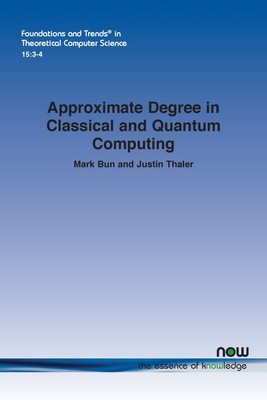
- We will send in 10–14 business days.
- Author: Mark Bun
- Publisher: Now Publishers
- ISBN-10: 1638281408
- ISBN-13: 9781638281405
- Format: 15.6 x 23.4 x 1.1 cm, softcover
- Language: English
- SAVE -10% with code: EXTRA
Reviews
Description
The ability (or inability) to represent or approximate Boolean functions by polynomials is a central concept in complexity theory, underlying interactive and probabilistically checkable proof systems, circuit lower bounds, quantum complexity theory, and more. In this book, the authors survey what is known about a particularly natural notion of approximation by polynomials, capturing pointwise approximation over the real numbers.
This book covers recent progress on proving approximate degree lower and upper bounds and describes some applications of the new bounds to oracle separations, quantum query and communication complexity, and circuit complexity. The authors explain how several of these advances have been unlocked by a particularly simple and elegant technique, called dual block composition, for constructing solutions to this dual linear program. They also provide concise coverage of even more recent lower bound techniques based on a new complexity measure called spectral sensitivity. Finally, they show how explicit constructions of approximating polynomials have been inspired by quantum query algorithms. This book provides a comprehensive review of the foundational and recent developments of an important topic in both classical and quantum computing. The reader has a considerable body of knowledge condensed in an accessible form to quickly understand the principles and further their own research.EXTRA 10 % discount with code: EXTRA
The promotion ends in 20d.21:46:04
The discount code is valid when purchasing from 10 €. Discounts do not stack.
- Author: Mark Bun
- Publisher: Now Publishers
- ISBN-10: 1638281408
- ISBN-13: 9781638281405
- Format: 15.6 x 23.4 x 1.1 cm, softcover
- Language: English English
The ability (or inability) to represent or approximate Boolean functions by polynomials is a central concept in complexity theory, underlying interactive and probabilistically checkable proof systems, circuit lower bounds, quantum complexity theory, and more. In this book, the authors survey what is known about a particularly natural notion of approximation by polynomials, capturing pointwise approximation over the real numbers.
This book covers recent progress on proving approximate degree lower and upper bounds and describes some applications of the new bounds to oracle separations, quantum query and communication complexity, and circuit complexity. The authors explain how several of these advances have been unlocked by a particularly simple and elegant technique, called dual block composition, for constructing solutions to this dual linear program. They also provide concise coverage of even more recent lower bound techniques based on a new complexity measure called spectral sensitivity. Finally, they show how explicit constructions of approximating polynomials have been inspired by quantum query algorithms. This book provides a comprehensive review of the foundational and recent developments of an important topic in both classical and quantum computing. The reader has a considerable body of knowledge condensed in an accessible form to quickly understand the principles and further their own research.

Reviews